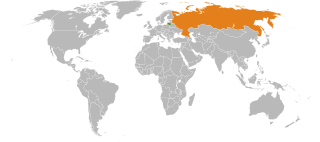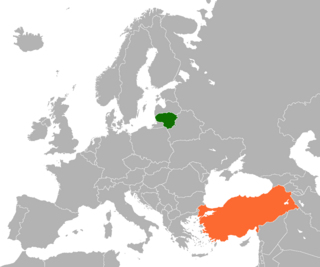
The Singing Revolution was a series of events from 1987 to 1991 that led to the restoration of independence of the three Soviet-occupied Baltic countries of Estonia, Latvia, and Lithuania at the end of the Cold War. The term was coined by an Estonian activist and artist, Heinz Valk, in an article published a week after the 10–11 June 1988 spontaneous mass evening singing demonstrations at the Tallinn Song Festival Grounds.

The Latvian diplomatic service in exile was the only governmental body of the Republic of Latvia which continued its activities during the Nazi and Soviet occupation of Latvia during 1940–1991. Latvian diplomats who were stationed in embassies and consulates at the moment of the occupation in 1940, refused to recognize the occupation and return to Soviet Latvia. They continued to formally represent the interests of Latvia in countries that did not recognize the Soviet annexation. After the restoration of Latvian independence in 1991, the diplomats started reporting to the restored Latvian Ministry of Foreign Affairs.

Estonia–Russia relations are the bilateral foreign relations between Estonia and Russia. Diplomatic relations between the two countries were established on 2 February 1920 after the Estonian War of Independence ended in Estonian victory with Russia recognizing Estonia's sovereignty and renounced any and all territorial claims on Estonia.

The three Baltic countries, or the Baltic states – Estonia, Latvia, and Lithuania – are held to have continued as independent states under international law while under Soviet occupation from 1940 to 1991, as well as during the German occupation in 1941–1944/1945. The prevailing opinion accepts the Baltic thesis that the Soviet occupation was illegal, and all actions of the Soviet Union related to the occupation are regarded as contrary to international law in general and to the bilateral treaties between the USSR and the three Baltic countries in particular.

The Embassy of Ukraine in Moscow was the chief diplomatic mission of Ukraine in the Russian Federation. It was located at 18 Leontyevsky Lane in Moscow.

The Embassy of Australia in Moscow is the diplomatic mission of Australia to the Russian Federation. The current head of post and Ambassador of Australia to the Russian Federation is John Geering. The embassy serves as the diplomatic mission for Australia to the Russian Federation, Armenia, Belarus, Kazakhstan, Kyrgyzstan, Tajikistan, Turkmenistan and Uzbekistan. The chancery is located at 10A/2 Podkolokolny Lane in the Tagansky District of Moscow.

Latvia–Russia relations are the bilateral foreign relations between Latvia and Russia. Latvia has an embassy in Moscow. The Russian Federation has an embassy in Riga.

Foreign relations exist between Australia and Estonia. Australia first recognised Estonia on 22 September 1921. Australia was among the first countries to re-recognise Estonia's independence on 27 August 1991. Both countries re-established diplomatic relations on 21 November 1991.

Canadian-Estonian relations are foreign relations between Canada and Estonia. Canada recognised Estonia in 1922 and re-recognised Estonia on August 26, 1991. Canada is represented in Estonia through its embassy in Riga (Latvia) and an honorary consulate in Tallinn. Estonia has an embassy in Ottawa and 4 honorary consulates. There are around 22,000 Canadians of Estonian descent. The two countries are part of the NATO military alliance.

Estonia–Poland relations are the bilateral relations between Estonia and Poland. Both nations are members of the EU, NATO, OECD, OSCE, Bucharest Nine, TSI, United Nations, COE, CBSS, HELCOM and WTO. The two countries became members of the EU in 2004.

Lithuania–Russia relations are the bilateral foreign relations between Lithuania and Russia. They have been marked by an long and turbulent history, dating back to the Middle Ages. The two countries share a common border through Kaliningrad Oblast. Lithuania has an embassy in Moscow and consulates in Kaliningrad and Sovetsk. Russia has an embassy in Vilnius.

The Soviet Union (USSR) occupied most of the territory of the Baltic states in its 1944 Baltic Offensive during World War II. The Red Army regained control over the three Baltic capitals and encircled retreating Wehrmacht and Latvian forces in the Courland Pocket where they held out until the final German surrender at the end of the war.
The Diplomatic Service of the Republic of Lithuania is the part of the governmental service tasked with enforcing the foreign policy set by the President, the Parliament, and the Government of the Republic of Lithuania. The head of the service is the Foreign Minister.

Lithuania–Turkey relations are the foreign relations between Lithuania and Turkey.

Foreign relations exist between Australia and Lithuania. Australia was among the first countries to re-recognise Lithuania's independence on 27 August 1991. Both countries formally established diplomatic relations on 6 November 1991. Australia is represented in Lithuania through its embassy in Warsaw, Poland. Lithuania has had an embassy in Canberra since 2021.
In the context of the Russo-Ukrainian War, many Russian diplomats and embassy officials were declared personae non gratae by countries around the world in 2022, and many foreign diplomats were also formally asked to leave Russia after their accreditation was cancelled.

Estonia and Ukraine established diplomatic relations on 4 January 1992. Relations between the two countries have remained consistently close, largely in part due to shared concerns of any aspirations of the Russian Federation. Estonia is a member of the European Union, which Ukraine applied for in 2022. Both countries are full members of the Council of Europe.
















